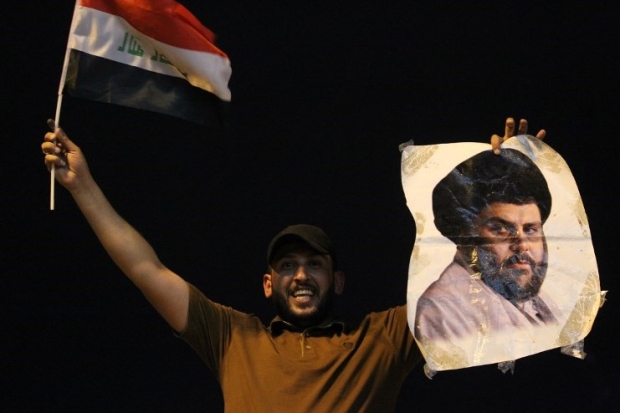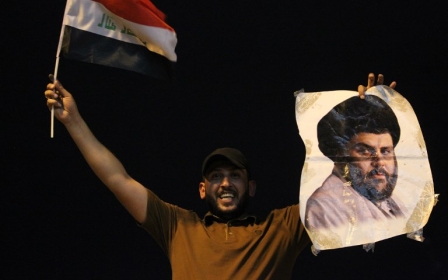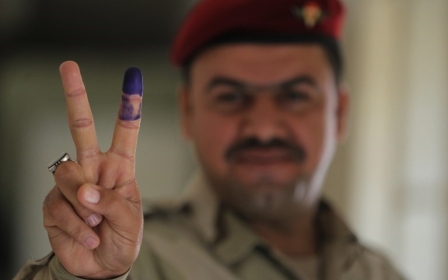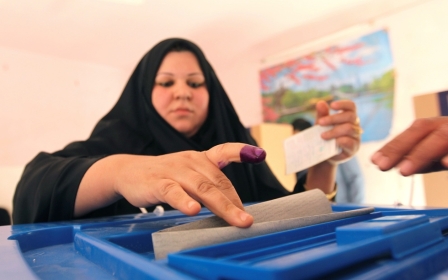Fire, fraud and recounts: The grim reality of Iraq's dirty politics

A fire erupted in a Baghdad warehouse storing ballots from Iraq's 12 May elections right before a manual recount was to be conducted. The fire happened at an inopportune time when electoral fraud allegations had undermined the integrity of the process.
Al-Sairoun, or "The Marchers", a coalition between the followers of Shia religious leader Muqtada al-Sadr and the Iraqi Communist party, saw the fire as a setback and an attempt to delay their ascension to power as victors of the elections.
On Tuesday, al-Sairoun announced that they will form a parliamentary bloc with Fatah, the coalition of Shia militias, who came in second in the election. This is a clear indication that al-Sadr will proceed to forge a government in spite of the delays.
Who was behind the fire and who stands to lose and gain from this incident remains in question. What is not in doubt is this series of affairs will delay the formation of a new Iraqi government as has happened in the past. For example, after the 2010 elections, the negotiations over a new government took nine months.
This delay would occur at a time when voters expressed - through the ballot box - their dissatisfaction with the incumbent political elites. The recent crisis is a desperate attempt to only prolong their tenure. Both Al-Sairoun and Fatah represented new faces on the ballot, featuring candidates who were untainted by previous political involvement.
The Election Recount
On Monday, Iraqi police arrested four men, three fellow police officers and an election committee employee in connection with the fire. Their rationale remains unknown. The fire erupted after the Iraqi parliament fired the nine-member independent commission that supervised the election and replaced it with nine judges to oversee a manual vote recount.
The vote recount had been loudly called for by the losers of the election, while the victors, like al-Sairoun, have urged their supporters to show patience while hinting that this recount is a delaying tactic by the losing side.
Al-Sairoun coalition won 54 of 329 seats in parliament, Fatah, the coalition of Shi'a militias, came in second with 47 seats, and incumbent Prime Minister Haidar al-Abadi’s coalition third, with 42 seats.
Without suggesting culpability for the fire, there are indeed Iraqi politicians and foreign powers who gain from the current political turmoil
By 6 June a call for a recount had passed in Iraq's parliament, lodged primarily by its members who had lost their seats. Iraq's Independent Higher Election Committee insisted there was no need for a recount, only to be dismissed by parliament. Just hours after parliament called for the recount an explosion killed 18 people in Sadr City, the bastion of Sadr's support.
By 10 June, when the judges were meeting, the warehouse in Baghdad was set ablaze, raising only more questions about the integrity of the electoral process. As both Abadi and the current parliament's term is set to expire on 30 June, the recent events will only delay the formation of a new government.
Undermining al-Sadr
Salim al-Jabouri, the Iraqi parliament speaker, who lost his seat, said that the elections should be repeated as a result of the fire. Critics say his demand, along with other members of parliament who fared poorly, is to disguise the fact that they are unwilling to accept Sadr's victory.
In this vein, Dhiaa al-Asadi, an aide to Sadr, tweeted: "Whoever burned the election equipment and document storage site had two goals: either cancelling the election or destroying the stuffed ballots counted amongst the results."
His statements, if they were to be read between the lines, indicate his disapproval of both the current Iraqi leadership and hints at foreign powers trying to sabotage al-Sadr's victory.
Political turmoil
Without suggesting culpability for the fire, there are indeed Iraqi politicians and foreign powers who gain from the current political turmoil.
In theory, as al-Sadr had run on a platform of rejecting both American and Iranian influence in Iraq, both the US and Iran indirectly benefit from the delay in forming a new government under Sadrist influence.
In terms of what happens next, a recount, or even more time consuming, a new election would delay the formation of a new government until January 2019. In both scenarios, the Sadrists' ascent to power would be delayed. However, neither Iran nor the Shia militias coalition favour a recount either, seeking to consolidate their second place position as part of al-Sadr's coalition.
Besides the Sadrists and Shia militias, both Kurdish parties, the Kurdistan Democratic Party and the Patriotic Union of Kurdistan, have opposed a recount, as both parties were accused of election fraud. Iraq's political landscape thus has already fractured over this issue, and as long as it continues, will most likely cause other fissures.
With a delay in choosing a new prime minister, Abadi remains in office and retains all his powers. However, rather than delaying this process, Abadi might make an attempt to either provide his remaining seats to the new coalition, if he were allowed to continue as prime minister, serving as a compromise leader between al-Sairoun and Fatah.
Even with Abadi’s buy in, bringing the seat to 143, that is still short of a majority. Al-Sadr would need long and ardous negotiations to get numerous other parties to join his bloc. The fire, calls for a recount, or new elections will only delay this process.
The euphoria after 12 May that a non-sectarian, nationalist government was emerging seems to be dissipating in the face of the realities of Iraq's politics and an incumbent political elite desperate to hold onto power.
- Ibrahim al-Marashi is Associate Professor of Middle East History at California State University San Marcos. His publications include Iraq's Armed Forces: An Analytical History (2008), The Modern History of Iraq (2017), and A Concise History of the Middle East (forthcoming).
The views expressed in this article belong to the author and do not necessarily reflect the editorial policy of Middle East Eye.
Photo: A massive fire broke out at a ballot box storage site in Baghdad on 10 June (MEE/Sebastian Castelier).
This article is available in French on Middle East Eye French edition.
New MEE newsletter: Jerusalem Dispatch
Sign up to get the latest insights and analysis on Israel-Palestine, alongside Turkey Unpacked and other MEE newsletters
Middle East Eye delivers independent and unrivalled coverage and analysis of the Middle East, North Africa and beyond. To learn more about republishing this content and the associated fees, please fill out this form. More about MEE can be found here.






